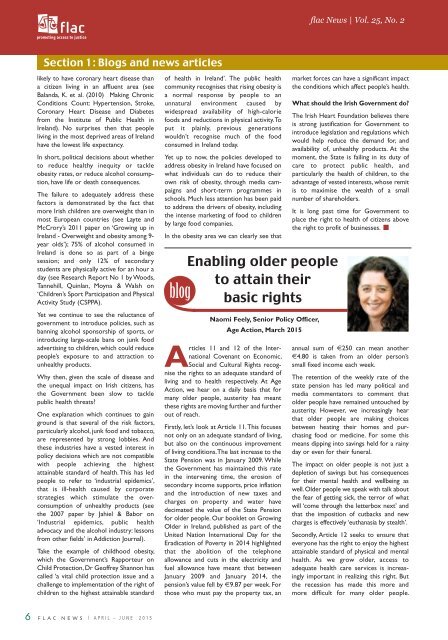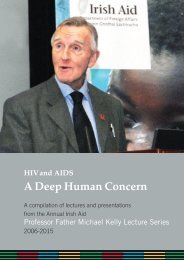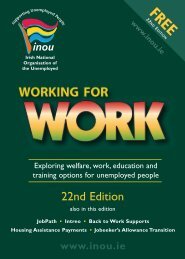FLAC News Summer 2015
You also want an ePaper? Increase the reach of your titles
YUMPU automatically turns print PDFs into web optimized ePapers that Google loves.
flac <strong>News</strong> | Vol. 25, No. 2<br />
Section 1: Blogs and news articles<br />
likely to have coronary heart disease than<br />
a citizen living in an affluent area (see<br />
Balanda, K. et al. (2010) Making Chronic<br />
Conditions Count: Hypertension, Stroke,<br />
Coronary Heart Disease and Diabetes<br />
from the Institute of Public Health in<br />
Ireland). No surprises then that people<br />
living in the most deprived areas of Ireland<br />
have the lowest life expectancy.<br />
In short, political decisions about whether<br />
to reduce healthy inequity or tackle<br />
obesity rates, or reduce alcohol con sump -<br />
tion, have life or death con se quen ces.<br />
The failure to adequately address these<br />
factors is demonstrated by the fact that<br />
more Irish children are overweight than in<br />
most European countries (see Layte and<br />
McCrory’s 2011 paper on ‘Growing up in<br />
Ireland - Overweight and obesity among 9-<br />
year olds’); 75% of alcohol consumed in<br />
Ireland is done so as part of a binge<br />
session; and only 12% of secondary<br />
students are physically active for an hour a<br />
day (see Research Report No 1 by Woods,<br />
Tannehill, Quinlan, Moyna & Walsh on<br />
‘Children’s Sport Participation and Physical<br />
Activity Study (CSPPA).<br />
Yet we continue to see the reluctance of<br />
government to introduce policies, such as<br />
banning alcohol sponsorship of sports, or<br />
introducing large-scale bans on junk food<br />
advertising to children, which could reduce<br />
people’s exposure to and attraction to<br />
unhealthy products.<br />
Why then, given the scale of disease and<br />
the unequal impact on Irish citizens, has<br />
the Government been slow to tackle<br />
public health threats?<br />
One explanation which continues to gain<br />
ground is that several of the risk factors,<br />
particularly alcohol, junk food and tobacco,<br />
are represented by strong lobbies. And<br />
these industries have a vested interest in<br />
policy decisions which are not compatible<br />
with people achieving the highest<br />
attainable standard of health. This has led<br />
people to refer to ‘industrial epidemics’,<br />
that is ill-health caused by corporate<br />
strategies which stimulate the overconsumption<br />
of unhealthy products (see<br />
the 2007 paper by Jahiel & Babor on<br />
‘Industrial epidemics, public health<br />
advocacy and the alcohol industry: lessons<br />
from other fields’ in Addiction Journal).<br />
Take the example of childhood obesity,<br />
which the Government’s Rapporteur on<br />
Child Protection, Dr Geoffrey Shannon has<br />
called ‘a vital child protection issue and a<br />
challenge to implementation of the right of<br />
children to the highest attainable standard<br />
of health in Ireland’. The public health<br />
community recognises that rising obesity is<br />
a normal response by people to an<br />
unnatural environment caused by<br />
widespread availability of high-calorie<br />
foods and reductions in physical activity. To<br />
put it plainly, previous generations<br />
wouldn’t recognise much of the food<br />
consumed in Ireland today.<br />
Yet up to now, the policies developed to<br />
address obesity in Ireland have focused on<br />
what individuals can do to reduce their<br />
own risk of obesity, through media cam -<br />
paigns and short-term programmes in<br />
schools. Much less attention has been paid<br />
to address the drivers of obesity, including<br />
the intense marketing of food to children<br />
by large food companies.<br />
In the obesity area we can clearly see that<br />
blog<br />
Enabling older people<br />
to attain their<br />
basic rights<br />
Naomi Feely, Senior Policy Officer,<br />
Age Action, March <strong>2015</strong><br />
Articles 11 and 12 of the Inter -<br />
national Covenant on Economic,<br />
Social and Cultural Rights recog -<br />
nise the rights to an adequate stand ard of<br />
living and to health respecti vely. At Age<br />
Action, we hear on a daily basis that for<br />
many older people, austerity has meant<br />
these rights are moving further and further<br />
out of reach.<br />
Firstly, let’s look at Article 11. This focuses<br />
not only on an adequate standard of living,<br />
but also on the continuous improvement<br />
of living conditions. The last increase to the<br />
State Pension was in January 2009. While<br />
the Government has maintained this rate<br />
in the intervening time, the erosion of<br />
secondary income supports, price inflation<br />
and the introduction of new taxes and<br />
charges on property and water have<br />
decimated the value of the State Pension<br />
for older people. Our booklet on Growing<br />
Older in Ireland, published as part of the<br />
United Nation International Day for the<br />
Eradication of Poverty in 2014 highlighted<br />
that the abolition of the telephone<br />
allowance and cuts in the electricity and<br />
fuel allowance have meant that between<br />
January 2009 and January 2014, the<br />
pension’s value fell by €9.87 per week. For<br />
those who must pay the property tax, an<br />
market forces can have a significant impact<br />
the conditions which affect people’s health.<br />
What should the Irish Government do?<br />
The Irish Heart Foundation believes there<br />
is strong justification for Government to<br />
introduce legislation and regulations which<br />
would help reduce the demand for, and<br />
availability of, unhealthy products. At the<br />
moment, the State is failing in its duty of<br />
care to protect public health, and<br />
particularly the health of children, to the<br />
advantage of vested interests, whose remit<br />
is to maximise the wealth of a small<br />
number of shareholders.<br />
It is long past time for Government to<br />
place the right to health of citizens above<br />
the right to profit of businesses. n<br />
annual sum of €250 can mean another<br />
€4.80 is taken from an older person’s<br />
small fixed income each week.<br />
The retention of the weekly rate of the<br />
state pension has led many political and<br />
media commentators to comment that<br />
older people have remained untouched by<br />
austerity. However, we increasingly hear<br />
that older people are making choices<br />
between heating their homes and pur -<br />
chasing food or medicine. For some this<br />
means dipping into savings held for a rainy<br />
day or even for their funeral.<br />
The impact on older people is not just a<br />
depletion of savings but has consequences<br />
for their mental health and wellbeing as<br />
well. Older people we speak with talk about<br />
the fear of getting sick, the terror of what<br />
will ‘come through the letterbox next’ and<br />
that the imposition of cutbacks and new<br />
charges is effectively ‘euthanasia by stealth’.<br />
Secondly, Article 12 seeks to ensure that<br />
everyone has the right to enjoy the highest<br />
attainable standard of physical and mental<br />
health. As we grow older, access to<br />
adequate health care services is increas -<br />
ingly important in realizing this right. But<br />
the recession has made this more and<br />
more difficult for many older people.<br />
6<br />
F L A C N E W S l A P R I L – J U N E 2 0 1 5





